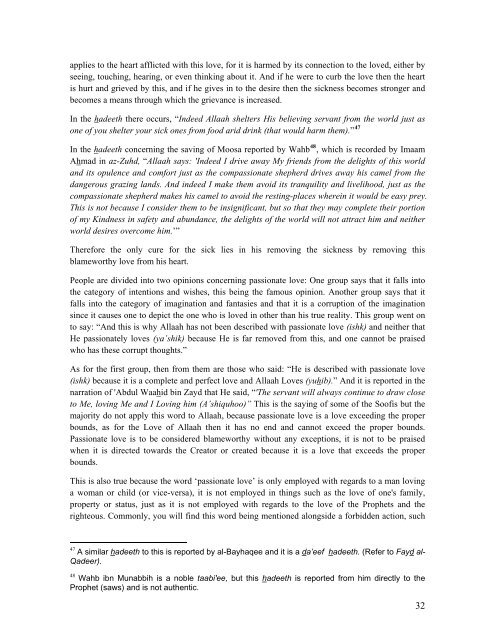Create successful ePaper yourself
Turn your PDF publications into a flip-book with our unique Google optimized e-Paper software.
applies to <strong>the</strong> <strong>heart</strong> afflicted with this love, for it is harmed by its connection to <strong>the</strong> loved, ei<strong>the</strong>r by<br />
seeing, touching, hearing, or even thinking about it. And if he were to curb <strong>the</strong> love <strong>the</strong>n <strong>the</strong> <strong>heart</strong><br />
is hurt and grieved by this, and if he gives in to <strong>the</strong> desire <strong>the</strong>n <strong>the</strong> sickness becomes stronger and<br />
becomes a means through which <strong>the</strong> grievance is increased.<br />
In <strong>the</strong> hadeeth <strong>the</strong>re occurs, “Indeed Allaah shelters His believing servant from <strong>the</strong> world just as<br />
one <strong>of</strong> you shelter your sick ones from food arid drink (that would harm <strong>the</strong>m).” 47<br />
In <strong>the</strong> hadeeth concerning <strong>the</strong> saving <strong>of</strong> Moosa reported by Wahb 48 , which is recorded by Imaam<br />
Ahmad in az-Zuhd, “Allaah says: 'Indeed I drive away My friends from <strong>the</strong> delights <strong>of</strong> this world<br />
and its opulence and comfort just as <strong>the</strong> compassionate shepherd drives away his camel from <strong>the</strong><br />
dangerous grazing lands. And indeed I make <strong>the</strong>m avoid its tranquility and livelihood, just as <strong>the</strong><br />
compassionate shepherd makes his camel to avoid <strong>the</strong> resting-places wherein it would be easy prey.<br />
This is not because I consider <strong>the</strong>m to be insignificant, but so that <strong>the</strong>y may complete <strong>the</strong>ir portion<br />
<strong>of</strong> my Kindness in safety and abundance, <strong>the</strong> delights <strong>of</strong> <strong>the</strong> world will not attract him and nei<strong>the</strong>r<br />
world desires overcome him.’”<br />
Therefore <strong>the</strong> only cure for <strong>the</strong> sick lies in his removing <strong>the</strong> sickness by removing this<br />
blameworthy love from his <strong>heart</strong>.<br />
People are divided into two opinions concerning passionate love: One group says that it falls into<br />
<strong>the</strong> category <strong>of</strong> intentions and wishes, this being <strong>the</strong> famous opinion. Ano<strong>the</strong>r group says that it<br />
falls into <strong>the</strong> category <strong>of</strong> imagination and fantasies and that it is a corruption <strong>of</strong> <strong>the</strong> imagination<br />
since it causes one to depict <strong>the</strong> one who is loved in o<strong>the</strong>r than his true reality. This group went on<br />
to say: “And this is why Allaah has not been described with passionate love (ishk) and nei<strong>the</strong>r that<br />
He passionately loves (ya’shik) because He is far removed from this, and one cannot be praised<br />
who has <strong>the</strong>se corrupt thoughts.”<br />
As for <strong>the</strong> first group, <strong>the</strong>n from <strong>the</strong>m are those who said: “He is described with passionate love<br />
(ishk) because it is a complete and perfect love and Allaah Loves (yuhib).” And it is reported in <strong>the</strong><br />
narration <strong>of</strong> 'Abdul Waahid bin Zayd that He said, “'The servant will always continue to draw close<br />
to Me, loving Me and I Loving him (A’shiquhoo)” This is <strong>the</strong> saying <strong>of</strong> some <strong>of</strong> <strong>the</strong> So<strong>of</strong>is but <strong>the</strong><br />
majority do not apply this word to Allaah, because passionate love is a love exceeding <strong>the</strong> proper<br />
bounds, as for <strong>the</strong> Love <strong>of</strong> Allaah <strong>the</strong>n it has no end and cannot exceed <strong>the</strong> proper bounds.<br />
Passionate love is to be considered blameworthy without any exceptions, it is not to be praised<br />
when it is directed towards <strong>the</strong> Creator or created because it is a love that exceeds <strong>the</strong> proper<br />
bounds.<br />
This is also true because <strong>the</strong> word ‘passionate love’ is only employed with regards to a man loving<br />
a woman or child (or vice-versa), it is not employed in things such as <strong>the</strong> love <strong>of</strong> one's family,<br />
property or status, just as it is not employed with regards to <strong>the</strong> love <strong>of</strong> <strong>the</strong> Prophets and <strong>the</strong><br />
righteous. Commonly, you will find this word being mentioned alongside a forbidden action, such<br />
47 A similar hadeeth to this is reported by al-Bayhaqee and it is a da’eef hadeeth. (Refer to Fayd al-<br />
Qadeer).<br />
48 Wahb ibn Munabbih is a noble taabi'ee, but this hadeeth is reported from him directly to <strong>the</strong><br />
Prophet (saws) and is not au<strong>the</strong>ntic.<br />
32


